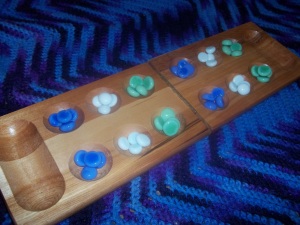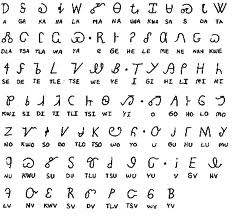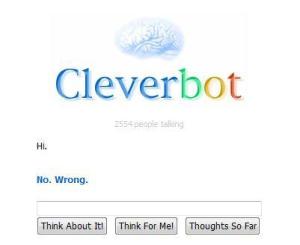I should probably start by acknowledging that, when I say “really awesome fun things,” I mean what other people mean when they say, “weird, pointless, and nerdy things.” In fact, people often respond to my “really awesome” ideas by giving me a strange look and saying, “But… why?” And the only answer I have for that is, “Because… awesomeness.” So keep that answer in your mind as you read this list and think, “But…why?” about everything on it.
Number One: Codify the language used on my imaginary planet
On my imaginary planet, they use a language that, unlike English and other Indo-European languages, has a syllabary rather than an alphabet. That means that each syllable is represented by a symbol. This system is not unique to the people of my planet; it is used in some Earth cultures, most notably Japanese and Cherokee. But it is much less widespread than a phonetic alphabet because it tends to be inefficient and more complex. That is, that’s the way it works on Earth. On my imaginary planet, they use a syllabaric language just because I personally think it would be more fun to make up. It actually won’t be too complex because there are only 100 different syllables in their language, and when I say 100, I mean 49, because they count in base seven. The 49 one-syllable words are one-digit integers, pronouns, articles, conjunctions, and prepositions. Two-syllable words are adjectives and adverbs. Three-syllable words are verb roots, (with a fourth syllable suffix determining tense, mood, and aspect) and five-syllable words are nouns. That allows for a vocabulary of as many as 10,001,010,100 words counting in base 7, which is 282,595,348 in base 10. (I should perhaps acknowledge at this point that there is a significant possibility that my math is wrong, because that is a thing that does happen sometimes.) Considering that there are approximately a million words in the English language, (an exact count would be impossible due to the nature of linguistics) it is safe to say that my planet’s imaginary language would not exhaust its capacity for vocabulary. With the exception of verbs and nouns, this language would have a more limited number of words than most Earth languages, and it is my intention for the grammar to also be simpler and involve fewer exceptions to rules. That’s as far as I’ve gotten; I haven’t formed the syllabary or made up any vocabulary yet. Once I do that, the next step is to translate the entire Bible into my imaginary language. And of course, the translation has to be done from the original Hebrew and Greek, because it is vitally important that all of these imaginary people have a scripturally accurate Bible. (Note: This translation could take a while, because I currently do not know Biblical Hebrew at all and only sort of kind of know a little Biblical Greek.)
Number Two: Memorize lots of Pi
I am a little embarrassed to admit that all of Pi that I can remember is 3.1415. Actually, I thought I remembered a few more digits, but it turns out that I had the 9 and the 2 switched. I was right that the next digit after that was a 6, but that was as far as I could get. I used to know a lot more Pi; I think that at one point, I had about 40 digits memorized. Of course, that’s not extremely impressive because there are some extreme nerds out there who have Pi memorized to a bajillion places. But the point is that I want to be one of those extreme nerds because that seems like a fun skill to have.
Number Three: Be an Artificially Artificial Intelligence
This game would make use of an anonymous and random internet chat program, of which there are several in existence. Before beginning, I would make a short list of random phrases. In the first chat, I would enter each of these phrases and make a note of how the other person responded. From that point on, anytime someone uses one of my original phrases, I would respond in the same way that person #1 responded. When chatting with person #2, I would use the phrases that had been typed by person #1 in chat #1. Once again, I would keep track of the responses for use in any later situation where someone types those phrases to me. Over the course of hundreds or thousands of chats, I would build up an extensive list telling me how to respond to things that people say. The longer I do this, the more my chat messages would begin to resemble an actual conversation with an actual person.
Number Four: Organize my wardrobe
This is what I need to do. I need to make a list of every non-underwear article of clothing that I own and determine which of them “go with” which others, so that I have a specific list of every outfit I have available. For each outfit, I shall then determine rules for when and where it can be worn depending upon factors such as degree of formality and suitability in cold or hot temperatures. Finally, I shall make a complicated and convoluted chart that tells me when to wear what. The point of this is not to simplify the process of getting dressed or to save time; the point is to have the fun of consulting a chart. Because that’s a very entertaining thing to do.
Number Five: Finish the mancala algorithm
 (I use the word “finish” because this is a project that I have started before. See this blog post from June 2012.) When a game of mancala begins, the first player has six choices, and only one of them makes any sense. It is fairly self-apparent that the number of possible moves increases exponentially for each additional move being considered in the calculation, and that the number of good moves also increases to such an extent that there is a very wide variety of possible outcomes. However, the game of mancala is a lot simpler than, for example, chess or scrabble, so it seems that it should be feasible, although ridiculously time-consuming, to create an algorithm determining what the best series of moves is. One goal of this algorithm is to develop a strategy that will always win; another goal is to determine how early in the game it is possible to predict beyond a doubt who will win. As far as I can tell, the best way to develop such an algorithm is to play lots and lots and lots of mancala and try out lots of possible combinations of moves. It isn’t literally necessary to play out every possible game, but it will be necessary to try out a lot of them, to try out various ways of continuing the game after various sets of opening moves, and to take a mathematical approach to the outcomes.
(I use the word “finish” because this is a project that I have started before. See this blog post from June 2012.) When a game of mancala begins, the first player has six choices, and only one of them makes any sense. It is fairly self-apparent that the number of possible moves increases exponentially for each additional move being considered in the calculation, and that the number of good moves also increases to such an extent that there is a very wide variety of possible outcomes. However, the game of mancala is a lot simpler than, for example, chess or scrabble, so it seems that it should be feasible, although ridiculously time-consuming, to create an algorithm determining what the best series of moves is. One goal of this algorithm is to develop a strategy that will always win; another goal is to determine how early in the game it is possible to predict beyond a doubt who will win. As far as I can tell, the best way to develop such an algorithm is to play lots and lots and lots of mancala and try out lots of possible combinations of moves. It isn’t literally necessary to play out every possible game, but it will be necessary to try out a lot of them, to try out various ways of continuing the game after various sets of opening moves, and to take a mathematical approach to the outcomes.
Number Six: Learn how to talk in Iambic Pentameter
It seems to me that the ultimate test of quick thinking is the ability to maintain a poetic meter and rhyme scheme in conversational speech. One would have to count stressed and unstressed syllables and think of rhymes all while concentrating on communicating whatever it is that one wants to say in the context of the given conversation. I’m not sure if such a thing would be possible, but it would be so totally awesome if it was.
Number Seven: Continue my experiments on whether putting your hands on your face helps you think
Many people, myself included, will sometimes put their hands on their face while they are thinking, and I am curious about why. In the past, I have made up experiments to test the intellectual effects of this gesture. (See these two blog posts from Summer 2012) These tests have obviously been inadequate to answer this question for various reasons. For one thing, they were conducted in the same way, which measured intellectual activity by memorizing a string of random digits. But memorization isn’t the only kind of thought. It seems to me that a strategic game is a more thorough test of effective thought. Chess is the ideal game for this experiment because it has no element of luck and is more intellectually stimulating than certain other games like checkers. (In case anyone is interested, I dislike the game of checkers and am always glad for an opportunity to say so.) The next experiment would involve playing consecutive online chess games, all using the same time limit, for many hours on end. During some games, I would rest my face on my hands while I think, and during other games, I would make sure not to touch my face at all. This experiment would have to be repeated several times on different days in order to decrease the risk of confounding variables. I imagine that I would need to play a few hundred games before calculating the results. Even then, these results would be meaningless unless I came up with further experiments which would involve other people and other methods of measuring intellectual activity.
Number Eight: Memorize cool movies
 This one is pretty self-explanatory. It also is quite obvious that the first couple movies that I would memorize would be Star Wars and The Princess Bride. Others that would be high on the list would be the other Star Wars movies, Monty Python and the Holy Grail, The Hitchhiker’s Guide to the Galaxy, the Back to the Future trilogy, and The Matrix. You know, all those movies that cool people quote all the time.
This one is pretty self-explanatory. It also is quite obvious that the first couple movies that I would memorize would be Star Wars and The Princess Bride. Others that would be high on the list would be the other Star Wars movies, Monty Python and the Holy Grail, The Hitchhiker’s Guide to the Galaxy, the Back to the Future trilogy, and The Matrix. You know, all those movies that cool people quote all the time.
Number Nine: Finish this list
This list is incomplete because there are a semi-infinite number of really awesome fun things that I would do if I had time on my hands. There are a bunch that I had intended to include in this partial list that have temporarily slipped my mind, and I’m going to go ahead and post this without them because what I have here is already sufficiently long. Then there are others that I thought of a long time ago and have completely forgotten, and many more that simply haven’t ever occurred to me yet. Just to finish the list would be an unachievable goal. But it would be entertaining to spend a lot of time working on it.

